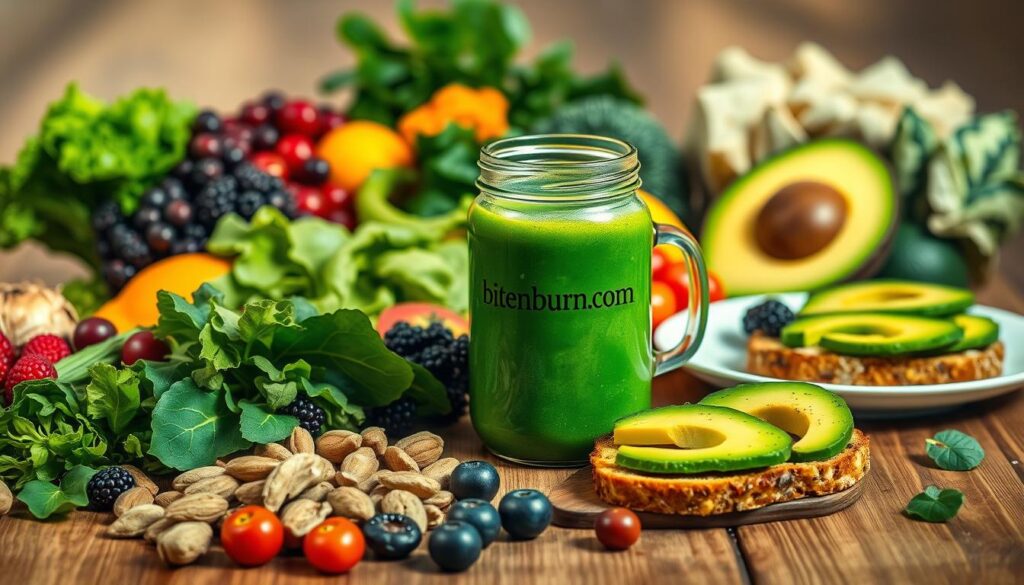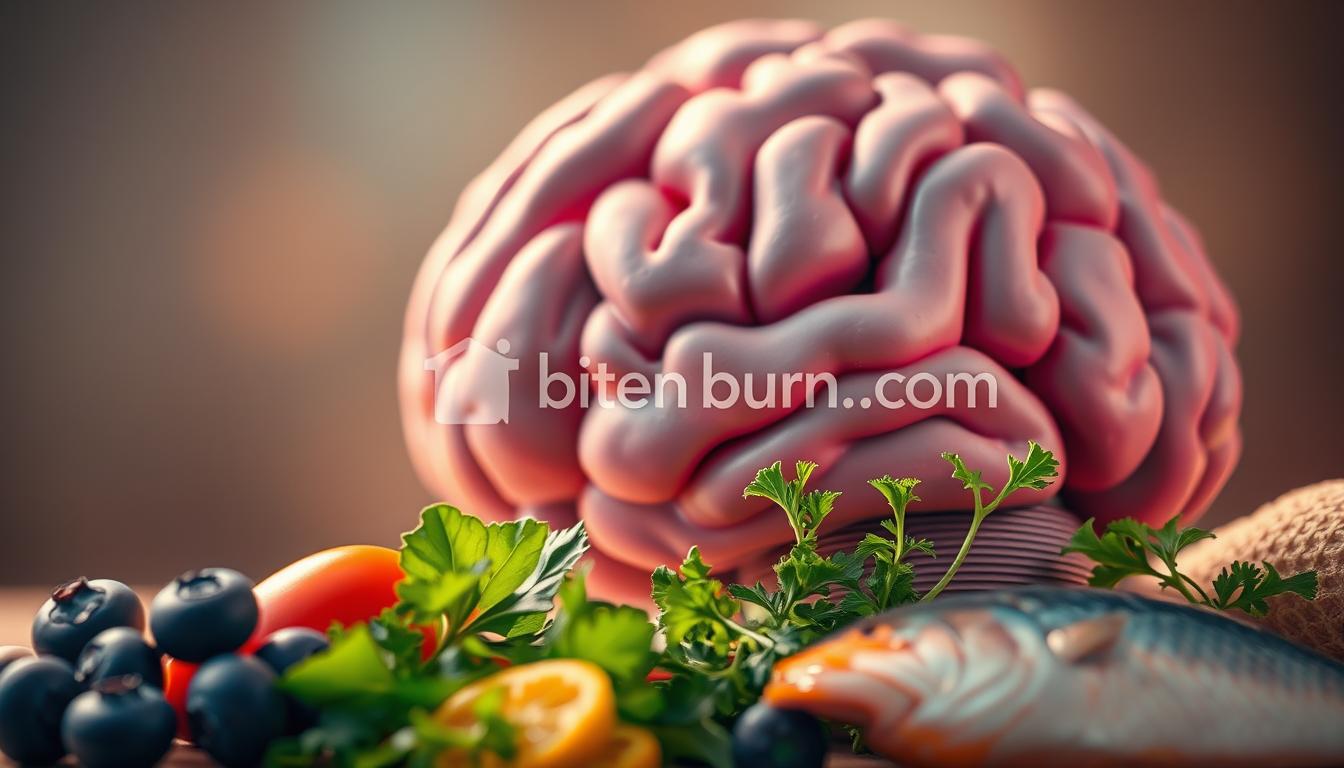Did you know that what you eat can significantly impact your mental health and mood? A growing body of research highlights the critical connection between nutrition and mental wellness, revealing that a balanced diet rich in specific nutrients can alleviate symptoms of anxiety and depression.
By incorporating key foods into your daily meals, you can support your brain’s function and overall emotional health. Nutrient deficiencies can sometimes contribute to mood swings, irritability, and even depression, making it essential to understand the role of nutrition in maintaining good mental health.
Key Takeaways
- Discover how the foods you eat directly impact your brain chemistry and overall mental wellness.
- Learn about the critical connection between nutrition and mental health.
- Understand how specific vitamins, minerals, and nutrients can help alleviate symptoms of anxiety and depression.
- Explore how making simple dietary changes can improve your mood and emotional stability.
- Identify key foods that contain essential nutrients for optimal brain function.
The Connection Between Nutrition and Mental Health
The intricate relationship between nutrition and mental health is becoming increasingly evident as research uncovers the profound impact of diet on brain function. The food you consume plays a crucial role in maintaining a healthy brain and influencing your mood. A diet rich in essential nutrients supports the complex communication network between your gut and brain, known as the gut-brain axis.
Nutrients from your diet directly affect the production of neurotransmitters such as serotonin, dopamine, and GABA, which regulate your mood and overall mental well-being. Understanding this connection can help you make informed choices about your diet to support your mental health.
How Food Affects Your Brain Chemistry
The nutrients in your food have a direct impact on neurotransmitter production in your brain. For instance, certain foods contain compounds that may influence the levels of dopamine, serotonin, and GABA, potentially improving your mood. A diet lacking in essential nutrients can disrupt this delicate balance, potentially leading to mood disorders.
| Nutrient | Food Sources | Impact on Brain Chemistry |
|---|---|---|
| Omega-3 Fatty Acids | Fatty fish, nuts, seeds | Supports brain health, reduces inflammation |
| Vitamin D | Sunlight, fatty fish, fortified dairy | Regulates mood, supports overall health |
| Magnesium | Dark leafy greens, nuts, whole grains | Calms the nervous system, supports neurotransmitter function |
The Gut-Brain Axis: Your Second Brain
The gut microbiome plays a significant role in brain health, with research showing a connection between beneficial gut bacteria and lower rates of depression. The gut produces many of the same neurotransmitters as the brain, earning it the nickname “second brain.” Maintaining a healthy gut through a balanced diet rich in prebiotics and probiotics is essential for supporting mental wellness.
Understanding Mental Wellness and Nutrition

A well-balanced diet is essential for supporting mental wellness and overall brain health. Nutrient deficiencies can sometimes contribute to mood swings, irritability, and even depression. Vitamins, minerals, antioxidants, and healthy fats are crucial for maintaining a strong connection between the gut and the brain.
Signs of Nutrient Deficiencies Affecting Mental Health
Identifying the signs of nutrient deficiencies is crucial for addressing their impact on mental health. Common symptoms include fatigue, irritability, and difficulty concentrating. Specific deficiencies, such as a lack of vitamin B12 or omega-3 fatty acids, have been linked to depression and anxiety. Recognizing these signs early can help in taking corrective measures through dietary adjustments or supplements.
How Diet Complements Other Mental Health Treatments
Dietary changes can work alongside traditional mental health treatments like therapy and medication. The emerging field of nutritional psychiatry focuses on using food to improve mental health outcomes. By making informed dietary choices, individuals can support their mental wellness and potentially alleviate symptoms of stress and anxiety. A personalized approach to nutrition is key, as individual needs vary.
The Best Vitamins and Foods That Boost Your Mental Wellness
Boosting your mental wellness starts with understanding the best vitamins and foods that support brain health. A well-balanced diet rich in specific nutrients can enhance your mood, reduce anxiety, and improve focus. By incorporating key foods into your daily meals, you can support your brain’s function and your emotional health.
Essential Nutrients for Brain Health
Certain nutrients have been shown to support mental health by nourishing the brain and nervous system, balancing mood, and even helping reduce symptoms of anxiety and depression. These include omega-3 fatty acids, B vitamins, magnesium, zinc, and antioxidants, which play a critical role in supporting brain function.
- Omega-3 fatty acids support brain health and have been linked to improved mental health outcomes.
- B vitamins, particularly B6, B12, and folate, are crucial for mood regulation.
- Magnesium and zinc are minerals that support mental balance and overall brain health.
Creating a Mental Wellness Nutrition Plan
To create a mental wellness nutrition plan, start by incorporating brain-healthy foods into your diet gradually. Focus on nutritional density by choosing nutrient-rich foods over supplements. Balance your plate to ensure you’re getting all the necessary nutrients for optimal brain health.
| Nutrient | Food Sources | Benefits |
|---|---|---|
| Omega-3 Fatty Acids | Fatty fish, nuts, seeds | Supports brain health, reduces inflammation |
| B Vitamins | Whole grains, lean meats, eggs | Crucial for mood regulation, energy production |
| Magnesium | Dark leafy greens, nuts, seeds | Supports mental balance, reduces stress |
By understanding the role of these nutrients and incorporating them into your diet, you can take a significant step towards improving your mental wellness.
Omega-3 Fatty Acids: Brain-Building Powerhouses

The importance of omega-3 fatty acids for brain function and mental well-being cannot be overstated. These essential nutrients, particularly EPA and DHA, have been shown to help reduce symptoms of depression and promote better mental health.
Omega-3 fatty acids play a crucial role in maintaining the health of your brain. They support the production and function of neurotransmitters, which are vital for regulating mood. By incorporating omega-3 rich foods into your diet, you can potentially alleviate symptoms of depression and support overall brain health.
How Omega-3s Support Neurotransmitter Function
Omega-3 fatty acids are essential for the proper functioning of neurotransmitters like serotonin and dopamine, which are crucial for mood regulation. By supporting the production and function of these chemicals, omega-3s help maintain a healthy mood and reduce the risk of depression.
Top Food Sources of Omega-3 Fatty Acids
Fatty fish like salmon, mackerel, and sardines are rich in omega-3 fatty acids. For those following a vegetarian or vegan diet, plant-based sources like flaxseeds, chia seeds, and walnuts are excellent alternatives. Incorporating these foods into your diet can help support your brain health and overall well-being.
B Vitamins: Fuel for Your Brain

Your brain relies heavily on B vitamins to regulate mood, energy levels, and overall cognitive function. B vitamins are instrumental in producing neurotransmitters such as serotonin and dopamine, which are crucial for feelings of happiness and emotional stability. Low levels of B vitamins have been linked to fatigue, irritability, and symptoms of depression.
B vitamins, particularly B6, B12, and folate, play a significant role in brain health. Vitamin B12 is essential for the health of nerve cells and the production of red blood cells, which transport oxygen to the brain. A deficiency in B12 can lead to cognitive decline, memory loss, and mood disturbances. According to the National Institutes of Health, Vitamin B12 deficiency is a significant concern, especially among older adults and vegetarians.
The Roles of B6, B12, and Folate
B6, B12, and folate are known as the mood-regulating trio. They are crucial for metabolizing proteins and converting them into neurotransmitters that affect mood. Vitamin B6 is involved in the production of serotonin and dopamine, while folate helps convert homocysteine into neurotransmitters. A deficiency in these vitamins can lead to decreased neurotransmitter production, potentially resulting in depression and other mood disorders.
For more information on the importance of these vitamins, visit the Harvard Health Publishing article on folate, Vitamin B6, and Vitamin B12 in mood disorders.
Foods Rich in B Vitamins
To maintain optimal brain function and mental clarity, it’s essential to consume foods rich in B vitamins. Leafy greens like spinach and kale are rich in folate, while eggs, meat, and fish are excellent sources of Vitamin B12. Legumes, such as lentils and chickpeas, are also rich in B vitamins. Fortified cereals and nutritional yeast are great options for vegetarians and vegans.
| Food Source | B Vitamin Content |
|---|---|
| Leafy Greens (Spinach, Kale) | Folate |
| Eggs, Meat, Fish | Vitamin B12 |
| Legumes (Lentils, Chickpeas) | Folate, B6 |
| Fortified Cereals | B12, Folate |
Magnesium and Zinc: Minerals for Mental Balance

Magnesium and zinc are two essential minerals that have a profound impact on mental balance and overall health. These minerals play crucial roles in various bodily functions, including those that directly affect mental wellness. Ensuring adequate intake of magnesium and zinc can significantly contribute to maintaining a healthy mental state.
Magnesium is often referred to as “nature’s relaxant” due to its calming effects on the nervous system. It helps regulate the body’s response to stress by controlling the release of stress hormones like cortisol. A deficiency in magnesium can lead to heightened anxiety, tension, and even insomnia. On the other hand, zinc is involved in many biochemical processes in the brain, including neurotransmitter function and synaptic activity regulation. Low levels of zinc have been associated with increased symptoms of depression and anxiety.
Calming Effects of Magnesium on the Nervous System
Magnesium supports the production of GABA, a neurotransmitter that promotes calmness and relaxation. It also helps regulate cortisol levels, potentially reducing the physical effects of stress on the body. By ensuring adequate magnesium intake, individuals can promote relaxation and reduce feelings of nervousness. Foods rich in magnesium include dark chocolate, avocados, nuts, and seeds.
Zinc’s Impact on Brain Function and Mood
Zinc plays a crucial role in brain development, neurotransmitter function, and neural communication. It helps protect the brain from oxidative stress, which can damage cells and impair function, leading to mood disturbances. Zinc deficiency can impact mood, cognitive function, and the ability to handle stress. Rich sources of zinc include oysters, meat, and legumes. Ensuring sufficient zinc intake is vital for maintaining mental balance and emotional resilience.
7 Powerful Foods That Enhance Mental Wellness
The connection between food and mental health is undeniable, and certain foods can significantly enhance your mental wellness. By incorporating these nutrient-rich foods into your diet, you can take a proactive approach to supporting your brain health and overall mental wellbeing.
Fatty Fish: Brain-Boosting Omega-3s
Fatty fish like salmon, mackerel, and sardines are considered ultimate brain foods due to their high omega-3 content. These essential fatty acids, particularly DHA and EPA, have been linked to lower levels of depression and improved cognitive function. Including fatty fish in your diet can support brain health and promote a healthy mood.
Dark Leafy Greens: Folate-Rich Mood Boosters
Dark leafy greens such as spinach, kale, and collard greens are rich in folate, a B vitamin essential for neurotransmitter production and mood regulation. Folate deficiency has been linked to depression, making these greens a crucial addition to a mental wellness diet.
Berries: Antioxidant Protection for Your Brain
Berries pack a wide range of antioxidants and phenolic compounds that play a key role in combating oxidative stress. By protecting your brain cells from oxidative damage, berries may improve memory and cognitive function, supporting overall brain health.
Fermented Foods: Probiotics for Gut-Brain Health
Fermented foods like yogurt, kimchi, sauerkraut, and kefir contain probiotics that support gut health, which is closely linked to mental health. A healthy gut microbiome can positively impact your mood and reduce stress levels.
Dark Chocolate: The Sweet Mood Enhancer
Dark chocolate contains flavanols and phenylethylamine, compounds that can boost serotonin levels and improve mood. Enjoying dark chocolate in moderation can be a delicious way to support your mental wellness.
Nuts and Seeds: Brain-Boosting Healthy Fats
Nuts and seeds are high in plant-based protein, healthy fats, and fiber, providing tryptophan, an amino acid responsible for producing mood-boosting serotonin. They also offer essential fatty acids, vitamin E, and minerals that support brain health and cognitive function.
Green Tea: L-Theanine for Calm Focus
Green tea is rich in L-theanine, an amino acid that encourages relaxation and reduces stress. L-theanine promotes alpha brain wave activity, creating a state of calm alertness without drowsiness, making it an excellent beverage choice for mental wellness.
By incorporating these seven powerful foods into your daily diet, you can take a proactive approach to enhancing your mental wellness. Whether you’re looking to improve your mood, reduce stress, or support overall brain health, these nutrient-rich foods can provide the benefits you’re seeking.
Everyday Superfoods for Mental Health Support

Incorporating everyday superfoods into your diet can significantly support your mental health. Certain foods have properties that not only nourish your body but also boost your mood and energy levels.
Bananas: Natural Mood Stabilizers
Bananas are rich in vitamin B6, which is crucial for producing neurotransmitters like serotonin and dopamine that regulate your mood. With 18g of sugar and 5.3g of dietary fiber, bananas help maintain stable blood sugar levels, preventing mood swings.
Oats: Steady Energy for Your Brain
Oats are an excellent source of fiber, providing 10g per 100g serving. The complex carbohydrates in oats release energy slowly, keeping your brain fueled. A diet rich in fiber, like oats, supports gut health, which is linked to mental wellness.
Coffee: More Than Just a Morning Pick-Me-Up
Coffee’s caffeine blocks adenosine, a compound that promotes tiredness, increasing alertness. It also boosts mood-enhancing neurotransmitters like dopamine. Moderate coffee consumption may lower depression risk and support brain health.
Creating a Mental Wellness Meal Plan
A well-structured meal plan can significantly boost your mental wellness by providing the necessary nutrients for optimal brain health. To start, focus on incorporating a variety of brain-healthy foods into your diet.
Breakfast Ideas for Brain Health
Begin your day with a nutrient-rich breakfast, such as a smoothie made with spinach, berries, and green tea, topped with chia seeds for an extra dose of healthy fats.
Lunch and Dinner Options to Boost Mood
For lunch, prepare a salad with mixed leafy greens, grilled fish, and a light vinaigrette dressing. For dinner, consider baked mackerel with steamed kale and roasted sweet potatoes for a balanced meal.
Brain-Healthy Snacks and Beverages
Swap your usual snack for a square of dark chocolate or a handful of nuts paired with green tea, which supports brain health and provides a natural energy boost.
Nutritional Strategies for Common Mental Health Concerns
7 key nutritional strategies can help you tackle common mental health concerns and improve your overall well-being. By incorporating specific foods and nutrients into your diet, you can better manage symptoms of anxiety, depression, and other mental health issues.
Foods That Help Manage Anxiety and Stress
Foods rich in magnesium, such as dark leafy greens and nuts, can help calm your nervous system and reduce anxiety. Additionally, fermented foods containing probiotics support gut health, which is linked to reduced stress levels.
Nutritional Support for Depression
Consuming foods high in omega-3 fatty acids, like fatty fish, and those rich in B vitamins, such as dark chocolate and leafy greens, can help alleviate symptoms of depression. These nutrients support brain health and promote neurotransmitter function.
Dietary Approaches for Focus and Concentration
Eating foods that provide steady energy, such as oats and bananas, can enhance focus and concentration. Additionally, antioxidant-rich foods like berries protect against cognitive decline and support mental clarity.
Conclusion: Nourishing Your Mind for Optimal Wellness
As you embark on your journey to mental wellness, it’s essential to remember that nourishing your mind is a powerful act of self-care. By choosing foods that boost your mood and brain function, you’re investing in your overall wellbeing. A well-rounded approach to mental health includes a balanced diet, regular exercise, mindfulness, and proper sleep.
To achieve optimal mental wellness, listen to your body’s signals and adjust your nutrition plan as needed. Be patient and persistent when making dietary changes, and don’t hesitate to seek professional help if you’re struggling with serious mental health concerns. By taking control of your mental health through informed food choices and a holistic approach, you can significantly improve your overall quality of life.


thanks for sharing amazing information its a need of most people may things get better with your trips
thanks a lot for your feedback
[…] people try to find mental wellness through meditation or exercise alone. But what if combining these with mindful cooking is even […]
[…] Calcium for bone health […]
[…] milk has been a cornerstone of traditional Ayurvedic medicine, offering a natural approach to wellness that addresses multiple aspects of health. This golden-hued beverage, known for its remarkable […]
[…] you know that certain foods can significantly impact your brain’s performance and overall mental wellbeing? The connection between diet and brain function is more profound than many realize, with specific […]
[…] in vitamin C, supports immune […]
[…] a variety of nutritious foods rich in vitamins and minerals can help boost your immune system. Simple ingredients, often found right in your […]